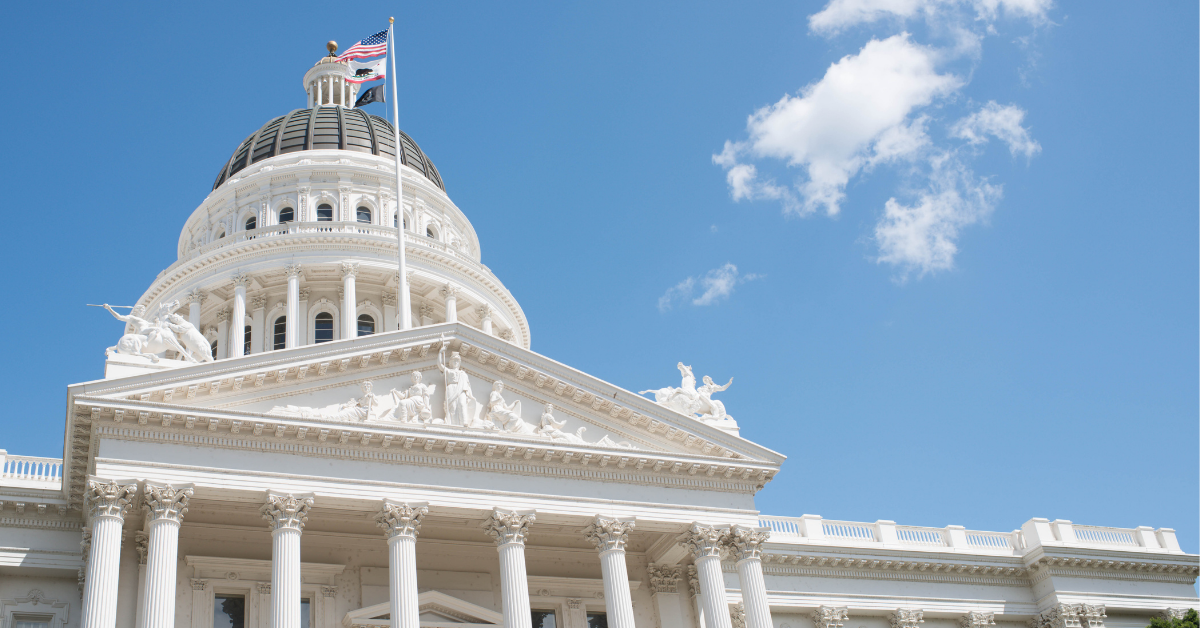Last week, California lawmakers returned to Sacramento to begin an eight-month legislative session, continuing discussions about key initiatives including COVID-19 regulations, housing, climate change, healthcare, and the state’s second consecutive massive budget surplus.
Not only will COVID-19 be a topic of debate, it will also affect how the session is conducted. With the ongoing surge of the omicron variant, seating for the press and public will be limited and masks and social distancing will be required. Meetings will be livestreamed and legislative staffers will have greater flexibility to work from home until at least mid-February.
Budget
On January 10, Governor Newsom unveiled his $286.4B state budget proposal – the California Blueprint. With a $45.7 billion surplus, the California Blueprint includes $34.6 billion in reserves and continues to pay down long-term retirement debts. It also prioritizes one-time spending over ongoing, allocating 86 percent of discretionary general funds to one-time spending. There are five key focus areas: (1) Covid*, (2) Climate Crisis, (3) Homelessness, (4) Cost of Living, and (5) Public Safety. The budget requires legislative approval.
Relevant Highlights include:
- (Covid-19) $2.7 billion to ramp up vaccines, boosters, statewide testing, and increase medical personnel to meet potential surges.
- Create Universal Access to Healthcare Coverage: Governor Newsom’s Blueprint will make California the first state in the nation to offer universal access to healthcare coverage for all state residents, regardless of immigration status. Beginning January 1, 2024, Medi-Cal will be expanded to all income-eligible Californians.
Healthcare
Lawmakers will explore a full-scale restructuring of the state’s healthcare system, creating a single-payer system known as CalCare in order to guarantee medical coverage to every resident. However, to accomplish this, they will have to generate billions through new taxes.
Assembly bill 1400 passed its first hurdle during a contentious health committee hearing on Jan. 11, but did not include details about a funding source. Exactly how much the proposal would cost is still unknown. A legislative bill analysis found that $163 billion in proposed new taxes would not cover the total program cost, which is estimated to be closer to $222 billion per year, not including potential cost savings from streamlined services.
Opponents question how CalCare would work and believe it could be detrimental to the state’s employment, economy, and quality of healthcare delivery. Supporters argue it represents a catalyst for change and that the proposed new taxes will total less than what employers and Californians currently pay for private insurance.
Office of Health Care Affordability
Legislators are expected to revisit the proposed Office of Health Care Affordability. Last year, California lawmakers passed AB 1130 to establish the office through a one-time spending plan of $30 million.
The office is intended to increase healthcare price and quality transparency, develop specific strategies and cost targets for different healthcare sectors, and impose financial consequences on healthcare entities that fail to meet these targets.
Governor Newsom originally proposed establishment of an Office of Health Care Affordability in his January 2020 budget, but the plan was subsequently withdrawn after the onset of the COVID-19 pandemic. Newsom’s 2022-2023 budget includes a reappropriation of $30 million for this plan.
Recall Reform
Months after Governor Newsom survived a recall election, State Senator Josh Newman (D-Fullerton) introduced a proposal to change California’s recall process. Sen. Newman’s proposed constitutional amendment, SCA 6, would automatically replace a recalled governor with the person serving as lieutenant governor, and would empower the governor to appoint individuals to replace other recalled constitutional officers, with legislative confirmation. A recalled state legislator would be replaced through a special election. California is one of 19 states with a recall process, but is only one of just two states that asks voters who should replace the recalled official on the same ballot as the recall question itself.
Changing the state Constitution would require a two-thirds vote in both houses of the Legislature and, if passed there, approval by California voters.
Gun Regulation
Governor Newsom and his staff are working with the state’s attorney general and legislative leadership to pass legislation allowing private citizens to enforce California’s ban on assault weapons. At the end of the 2021 legislative session, gun control became a hot item for the governor after a federal judge ruled the state’s ban on assault weapons unconstitutional. The ban remained in place as the state appealed.
In pushing for the legislation, the governor is looking to the approach used by Texas lawmakers to block most abortions, seeking to add the threat of private lawsuits to keep weapons off streets. The governor designated Attorney General Rob Bonta to draft a bill modeled after the Texas abortion law, crafting legislation that would allow private citizens to sue anyone who manufactures, distributes, or sells illegal assault weapons or “ghost guns.”
The Legislature would have to approve the gun proposal during the upcoming session in order for it to become law.



